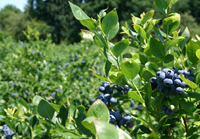|
Small
Growers to Receive GAP Certification Aid
The Oregon Blueberry Commission voted last year to reimburse smaller
growers $150 when they become certified under the ODA/USDA Good
Agricultural Practices act (GAP) program while the limited funds
are available.
Small farms were defined as anything less than 20 acres. Growers
need to show proof of passing the certification along with the receipt
they had to pay for the inspection. The refund program will end
December 31, 2011.
The funds will come from budget allocated to the Commission’s
Food Safety Program, said Eric Pond, Oregon Blueberry Commission
Secretary-Treasurer and chairman of the Food Safety Committee.
Pond, who manages blueberry production near Jefferson, said that
more and more blueberry packers and retailers are requiring GAP
certification.
 The
U.S. Highbush Blueberry Council has published a GAP booklet in both
English and Spanish that outlines basic food safety rules. “We
(OBC) have adopted it as kind of minimum guidelines, Pond said. The
U.S. Highbush Blueberry Council has published a GAP booklet in both
English and Spanish that outlines basic food safety rules. “We
(OBC) have adopted it as kind of minimum guidelines, Pond said.
For English, it can be accessed at http://www.nabcblues.org/good-practices/food-safety.pdf.
For Spanish, go to http://www.nabcblues.org/good-practices/food-safety-sp.pdf.
While the USHBC booklet gives growers a basic food safety program
to follow, growers will have to comply with ODA/USDA requirements,
Pond said. “They still will need to have an inspector come
out and get certified.”
Your commission strongly recommends that every grower consider adopting
a third-party audit certification in the interest of food safety.
ODA offers voluntary GAP certification under the USDA Federal-State
Audit Program. These audits are based on U.S. Food and Drug Administration’s
guidelines.
“There’s no regulatory (mandatory) requirements right
now for on-farm food safety,” said ODA certification and development
program manager Lindsay Eng.
To learn more about the program Google ODA GAP Manual and then click
on the link: ODA Agricultural Development and Marketing Division.
Pond said that growers can become GAP certified through several
entities in addition to ODA. “Most retailers require that
you have a food safety program and are certified. There are still
people who will accept your fruit without it being certified, but
that number is shrinking.” Each auditing organization has
its own set of guidelines that must be complied with. Eng said that
USDA is working on a new GAP “harmonized standard,”
which will be a blend of USDA and private standards.
The standards have as their main goal the elimination of pathogenic
microbes from fresh food supplies.
As of February 14, close to 80 Oregon blueberry growers were certified
by ODA/USDA, Eng said. The auditing fee is $75/hour, with a four-hour
minimum.
Audits, which take place only during harvest, are arranged for by
the grower. Eng recommends that growers line up an auditor one month
in advance of harvest. Growers whose harvest lasts longer than 30
days may be subject to an unannounced audit, Eng said.
|
Articles:
Message from the Chairman
Spotted
Wing Drosophila Update
Market
Outlook:
A Look Back …
and Ahead
Bumbles
and Blueberries
Organic
Blueberry Production Research Project
Critical
Program Needs Industry Support
Small
Growers to Receive GAP Certification Aid
Oregon
Fresh Season Promotion On a Roll for 2011
Bee
Fees Jump a Bit
Smooth
Move Increases Insulin Sensitivity
New
Trap Hits
the Spots
(Spotted Wing Drosophila)
OSU
Researcher Driving Blueberries up a Tree
USHBC
Unveils New “Little Blue Dynamos” Positioning and Campaign
for Highbush Blueberries
Watching
World Acreage and
Production Grow
Specialty
Crop Grant Supports Oregon Berry Festival;
Free Berry Vendor Space Available
|

 The
U.S. Highbush Blueberry Council has published a GAP booklet in both
English and Spanish that outlines basic food safety rules. “We
(OBC) have adopted it as kind of minimum guidelines, Pond said.
The
U.S. Highbush Blueberry Council has published a GAP booklet in both
English and Spanish that outlines basic food safety rules. “We
(OBC) have adopted it as kind of minimum guidelines, Pond said.